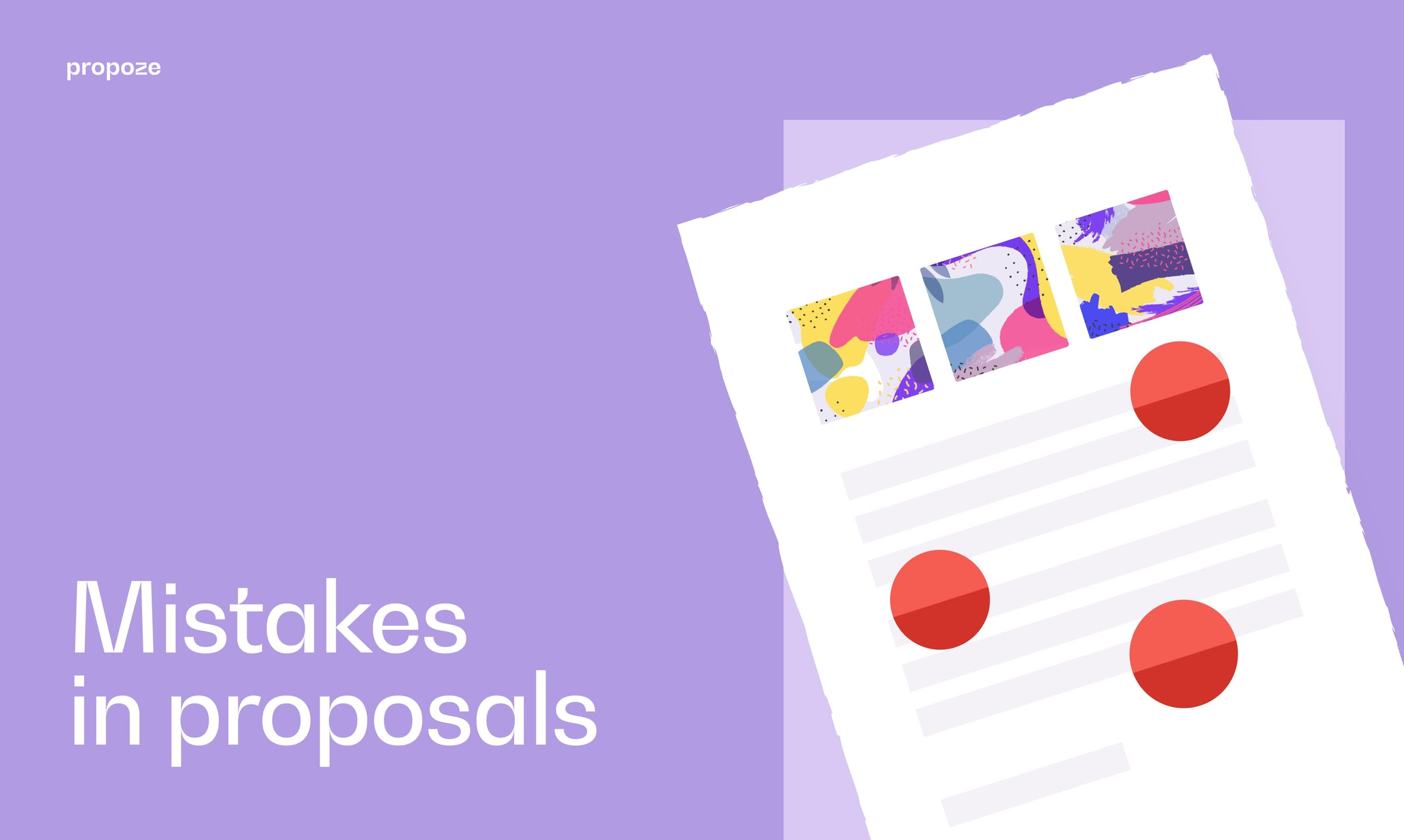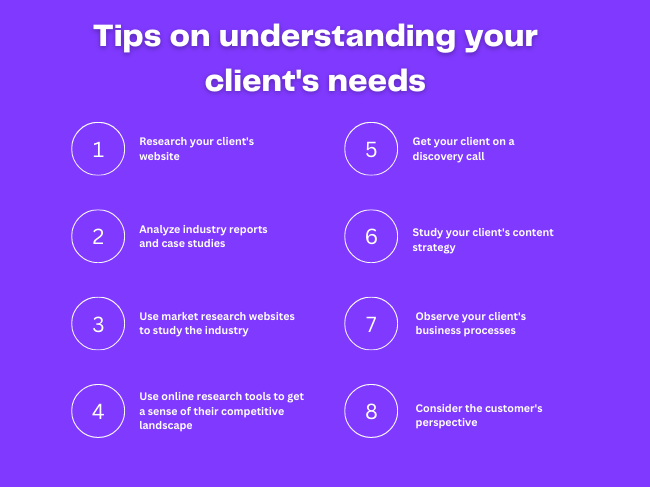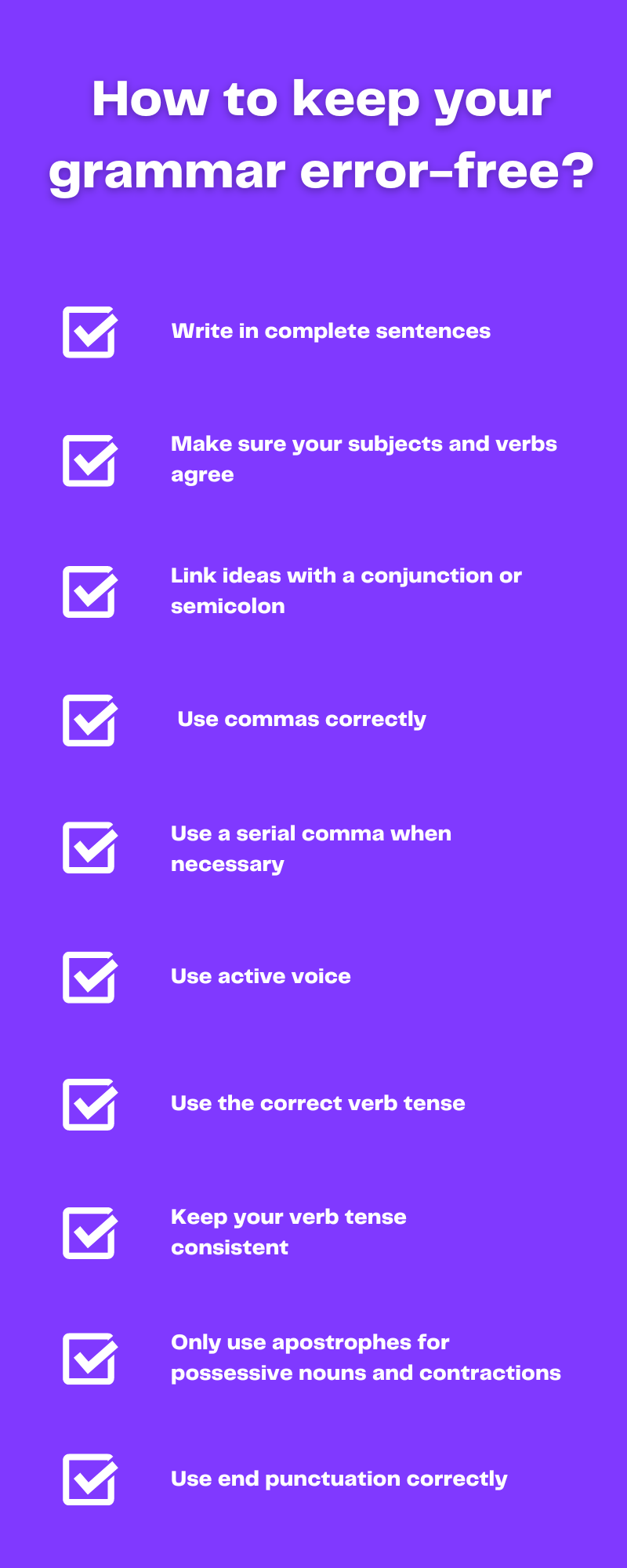8 Most Common Mistakes to Avoid in Your Sales Proposals
If you are tired of putting in the effort to write a sales proposal, only to receive no response from your clients? The mistakes you make in your sales proposals come with a hefty price tag. In this blog post, we go through the 8 most common mistakes you need to avoid when writing a sales proposal.
— Propoze

Mistakes in sales proposals often come at a hefty price. So, let us just ask you this:
Are you tired of giving your 100% when writing sales proposals only to get no response from your clients? You feel like you’re wasting your time writing all these sales proposals?
If you answered “yes” to these questions, you’ll absolutely love what’s waiting for you in this article.
Now is the best time to regroup, take a closer look at your sales proposals, and try to single out all the mistakes you’re making. This may be a bit difficult if you’re a 1-man-team, but that’s why you can count on our help.
In this article, we’ll go through the 8 most common mistakes you need to avoid when writing your sales proposals. Also, we’ll make sure you get all the helpful tips and advice you need to crush sales in 2023.
Let’s get you one step closer to winning your next client.
What are the most common sales proposal mistakes?
We can imagine that there are countless of mistakes you can make when writing a sales proposal, but some mistakes do repeat themselves. And they repeat so often that we decided to write a blog post about it.
Isn’t that something?
In short, all your sales proposals require is - more attention to detail and strategic preparation. You know the saying “The devil’s in the details.” And it sure is.
Now, let’s jump in and go through the 8 most common mistakes salespeople make in their sales proposals.
Mistake #1: You’re failing to understand your client’s needs
This is easily the most common mistake we see in sales proposals. Now, why is that so?
Every business is unique. Some may even disagree, but they’re in for a cold awakening. If you failed to take your time to understand where your client is now and where the client wants to be in, let’s say, 6 months - it’s almost certain your sales proposal will be to no avail.
It’s easy to get carried away with your own business goals and product offerings, but zoom out just for a minute. You’re trying to help your client solve a problem.
Here’s a good exercise. Try to put yourself in their shoes and think about different ways you can try to solve their problem. Feel free to take your time while doing this. Once you get to the “aha” moment where it’s crystal clear where your business comes in this entire formula, we can bet that you’ll get a bit excited.
Try to avoid as many uphill battles as possible. Always take your time to research the client’s industry, competitors, and pain points.
Here are a few tips from our blog post on writing an effective sales proposal:
- Use your client’s website and social media to gather information on their values, their target audience, and their brand voice. Also, you’ll find out what kind of content they publish.
- Find and analyze industry reports and studies to gain insight into the latest trends and big changes (scour the internet for all free information you can find)
- Use market research websites (like MarketsAndMarkets or Tracxn) to study the industry, get some statistics, and see where the industry is headed
- Don’t be afraid to interview the client - who can tell you better about their needs and pain points if not the client? This just goes to show them that you’re genuinely interested in helping them solve their problems. It’s a win-win tactic
- Use research tools like Ahrefs or SEMrush to gain a sense of their online competitive landscape. Find out more about their keyword strategy, their rankings, and traffic in just a few clicks. (Even though these are paid tools, their free versions can help you get the research done)
So, to eliminate this mistake from your sales proposals, you’ll want to:
- Make sure you actually understand the client's needs
- Keep the client’s needs in mind when writing the sales proposal
It may sound simple now when we’ve outlined it, but it takes a fair amount of time to get it done.
And if you want to get this right, there's no better way to find out what your client's needs are than a discovery call. We've compiled a list of the best discovery questions to ask on sales calls.
Be sure to include these questions in your sales calls and find out all the crucial info on your clients!

Mistake #2: Your writing lacks clarity and conciseness
The second mistake salespeople keep making in their sales proposals - no clarity, no conciseness. This famed, elusive duo can make or break your entire message!
Many of us have fallen into the trap of writing long, complex sentences that just leave our readers wondering what are we really talking about. It seems like we’re trying to impress ourselves with our knowledge of vocabulary, and not the clients.
It’s not hard to imagine that clients don’t like this.
If we want our message to be clearly understood, we need to be clear and concise. And if we want our readers to stick around and keep coming back, we need to make it easy for them to do so.
Writing is a skill that needs to be nurtured, but there are always some tips & tricks on how to get better instantly. Here’s what the University of Arizona’s Writing Center has to say:
- Choose the word that most clearly conveys your meaning
- Always follow “this”, “that”, “these”, and “those” with a noun
- Eliminate any unnecessary phrases and redundancies
- Write in active voice
- Shorten your wordy phrases
Also, here are some tools that can help you improve your writing:
- Hemingway - to improve your readability
- Grammarly - to get your grammar on point
- ZenPen - to eliminate the distractions
- OneLook Thesaurus - to improve your vocabulary
Luckily, both tools are free to use, so there’s nothing stopping you from becoming a wordsmith!
Mistake #3: Your sales proposal is poorly structured and organized
Poor organization and structure are the banes of every writer’s existence. Imagine your client is reading your sales proposal - and it’s badly structured and organized. It’s easy to conclude that they’ll have a hard time navigating through the proposal.
But the same thing goes for you. You’ll have trouble writing this proposal in the first place because you didn’t structure it properly.
In general, persuasive sales proposals are well-organized, start with basic offerings, and then proceed to go into detail about what benefits clients can expect.
And all this is often structured with proper H2, H3, and H4 headings.
If your sales proposal is lacking in terms of structure, there’s a good chance that clients won’t even bother themselves with reading it.
Here are some tips to remember when writing a sales proposal:
- Use bullet points or tables to make it more readable
- Break down your activities into sections with headings
- Make the proposal easy to skim over
- Highlight the most important parts with text formatting
The structure is incredibly important when it comes to sales proposals, so make sure you don’t overlook it when writing your next sales proposal.
If you're looking for a sales proposal software that can help you create structured and well-organized sales proposals, check out our guide for choosing the best proposal software.
Mistake #4: You are overemphasizing your company and products
The fourth mistake salespeople often make when writing proposals is focusing too much on their own company and products. Even though it can be tempting to write in detail about your accomplishments, experiences, and unique selling points, it’s more beneficial to focus on what clients want to see.
There is definitely room in sales proposals for presenting your company and skills. But giving yourself too much attention in sales proposals can easily be harmful.
No client is interested in reading about you for too long, especially if they’re reading it in a sales proposal.
Clients want to see what activities you’re going to execute, what kind of results you can provide, and how much is it going to cost. They want to know what’s in it for them.
To summarize, try to keep your sales proposal fully client-focused.
Mistake #5: You are not customizing your sales proposal for each client
The key to writing a winning sales proposal is personalization. Even though you can create a sales proposal template and just edit the small details, it’s usually not enough.
Don’t get us wrong - we emphasize the importance of templates and their huge time-saving benefit. But if we customize that template for every single client we aim to win over, the chances of winning the deal are much higher.
Find out how you can save time with sales proposal templates when using Propoze!
For example, if you include their name, reference some things they’ve said to you on a call or a meeting, and include relevant information related to their company, you leave a lasting impression.
This shows that you’re genuinely interested in helping your client and that you invested a certain amount in researching their company.
And if they have an issue one of your products or services can fix, point this out and explain how can you help them.
These sections are the ones they’ll be reading in detail. So, when writing a new sales proposal, avoid the mistake of not fully customizing it for the client. Personalization is extremely important and you should treat it as such whenever you approach a new client with a sales proposal.
P.S. Not every client will respond to your proposal – meaning you'll need to follow up with them to get an answer. Here's everything you need to know on how to follow up after sending a sales proposal.
Mistake #6: Your proposal is filled with grammar issues
Grammar issues can easily create trouble for you when trying to seal a deal. This is the easiest challenge to overcome and the most common mistake we’re seeing in sales proposals.
Even though this is a banal issue, it does have a high impact on your sales results.
According to Business NH Magazine, websites with poor grammar and spelling lose two times more potential customers. The same goes for sales proposals.
If your sales proposal is filled with grammatical errors, your prospective client will easily lose faith in your ability to deliver on your promises. They will start asking questions like:
“If they can’t get their grammar right in their sales proposal, how can I entrust them with delivering better business results?”
Luckily, in this day and age, we have tons of spell-checkers and grammar apps that can help you create a perfect, grammatically correct, sales proposal.
Here are some apps you can use to overcome this issue:
All in all, make sure you never send out a sales proposal if you haven’t checked and corrected all of the grammar mistakes.
Here's a checklist for fixing your grammar errors!

Mistake #7: You’re not communicating benefits clearly
Clients will make big decisions based on the value they’ll get from these decisions. They won’t depart with their money if the reason for it is not good enough.
Many sales proposal writers fail to understand this phenomenon. Benefits need to be clearly communicated. Unfortunately, they are either hidden in the description or left to the client to assume based on what they read in the proposal.
What do you do to combat this issue?
Structure + organization.
When writing a sales proposal, make sure you have a section dedicated to the main values and benefits your client can expect from you.
Make it clear for them to understand what they’ll be getting if they choose to work with you. Write down what kind of results can they expect and in what timeframe. Mention what are some direct and indirect benefits of your product or service and how they relate to your client’s business goals.
Mistake #8: Your sales proposal lacks proof and evidence
Even though your sales proposal shouldn’t be focused on your accomplishments, experiences, and skills, you should still include them.
A good practice is to include a separate section in your sales proposal where you can back up your claims with case studies and testimonials.
But know that you should not focus too much attention on this section. Even though case studies and testimonials add to your credibility, it’s not the most important part of the sales proposal.
Still, let them know what kind of results you generated in the past and what your past clients have to say about you.
Avoiding mistakes in sales proposals is not that easy. To make the entire proposal creation process a bit smoother, we've prepared for you an in-depth guide to writing an effective sales proposal. Check it out.
Create a winning sales proposal with Propoze
Sales proposals are essential in the business world, but they can be a bit tricky to master. By avoiding these most common mistakes and following our advice, you can create a spotless and effective proposal that can help you seal the deal.
Let’s just summarize what we talked about in this blog post:
- You should take your time to research your client’s needs
- Be careful when writing to ensure it’s clear and concise
- Structure and organize your sales proposal, no free form!
- Don’t brag too much about your accomplishments and experience
- Customize the sales proposal for every single client
- Be careful with grammar and spelling
- Let your client know exactly what they can expect from you
- Don’t forget to include a section for your proof and evidence
If you keep following this advice and stay careful when auditing your sales proposal, you’ll be well on your way to closing more clients!
And what better way to create and edit your sales proposal than with Propoze, a sales proposal software designed specifically for freelancers and small business owners.
Propose has everything you need to easily create a beautiful sales proposal. Create your own templates, edit proposals with a drag-and-drop editor, and share them with a single click.
It’s 100% free to use so why not give it a try? Here’s a link to our sign-up page where you create your free Propoze account in less than a minute.
Follow us on our LinkedIn, Twitter, and Instagram accounts! We post regularly on proposal and sales-related topics.